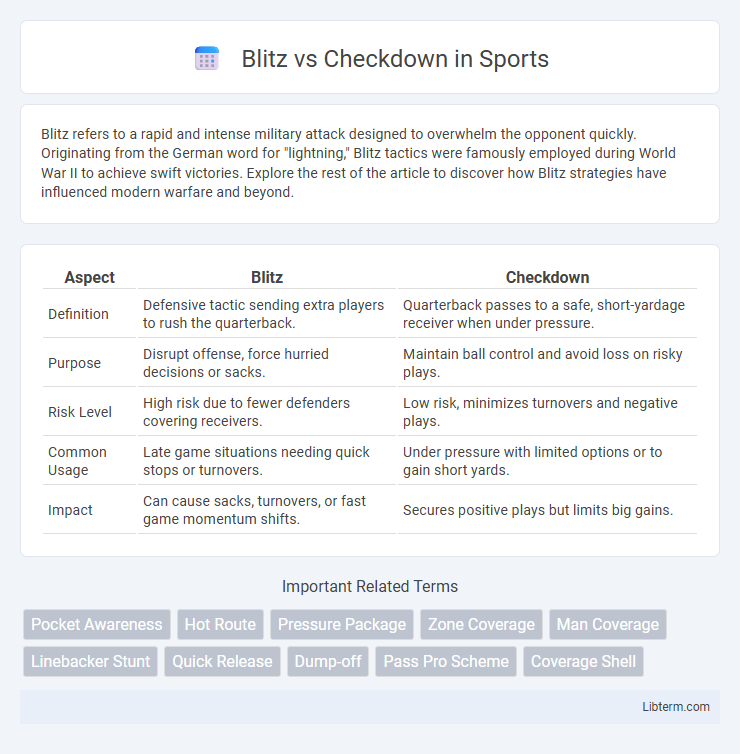Blitz refers to a rapid and intense military attack designed to overwhelm the opponent quickly. Originating from the German word for "lightning," Blitz tactics were famously employed during World War II to achieve swift victories. Explore the rest of the article to discover how Blitz strategies have influenced modern warfare and beyond.
Table of Comparison
| Aspect | Blitz | Checkdown |
|---|---|---|
| Definition | Defensive tactic sending extra players to rush the quarterback. | Quarterback passes to a safe, short-yardage receiver when under pressure. |
| Purpose | Disrupt offense, force hurried decisions or sacks. | Maintain ball control and avoid loss on risky plays. |
| Risk Level | High risk due to fewer defenders covering receivers. | Low risk, minimizes turnovers and negative plays. |
| Common Usage | Late game situations needing quick stops or turnovers. | Under pressure with limited options or to gain short yards. |
| Impact | Can cause sacks, turnovers, or fast game momentum shifts. | Secures positive plays but limits big gains. |
Understanding Blitz: Aggressive Defensive Strategy
Blitzing represents an aggressive defensive strategy where linebackers or defensive backs rush the quarterback to disrupt the play, often risking coverage gaps. This tactic aims to force hurried decisions or sacks, increasing defensive pressure and potential turnovers. Understanding blitzing is crucial for recognizing how defenses prioritize aggression over coverage to gain tactical advantages.
The Checkdown Explained: Safe Passing Option
The checkdown is a safe and strategic passing option in football, typically used when primary receivers are covered or pressured by a blitz. It involves the quarterback quickly throwing a short pass to a running back or tight end to avoid a sack and maintain positive yardage. This tactic minimizes risk while keeping the offense moving and exploiting defensive gaps created by aggressive blitzing.
Key Differences Between Blitz and Checkdown
Blitz and checkdown are distinct defensive and offensive strategies in football; a blitz involves sending additional defenders to pressure the quarterback aggressively, aiming for a sack or disruption, while a checkdown is a quarterback's quick, short pass to a running back or tight end when primary targets are covered. Blitzes increase the risk of giving up big plays due to fewer defenders in coverage, whereas checkdowns prioritize ball control and minimize turnover risk by opting for the safest, quickest option. Understanding these tactics highlights the balance between aggressive defense and conservative offensive decisions in game strategy.
Impact of Blitz on Quarterback Decision-Making
A blitz forces the quarterback to accelerate their decision-making process, often leading to hurried throws and increased risk of turnovers. The added pressure from blitzing defenders reduces the quarterback's time to read the defense and locate open receivers, impacting play execution. In contrast, facing a checkdown allows the quarterback more time and safer options, often diminishing offensive explosiveness.
How Checkdowns Counter Defensive Pressure
Checkdowns counter defensive pressure by providing a quick and safe release option when blitzers collapse the pocket, mitigating potential sacks and negative plays. They allow quarterbacks to exploit soft coverage underneath, maintaining offensive rhythm even under heavy pass rush. Utilizing checkdowns effectively forces defenses to reconsider aggressive blitz schemes, as it minimizes opportunities for impactful quarterback disruptions.
Strategic Uses of Blitz in Modern Football
The strategic use of blitzes in modern football centers on applying maximum pressure to disrupt the quarterback's timing and force hurried decisions. Blitz packages, involving linebackers or defensive backs, exploit offensive line weaknesses and create mismatches that can lead to sacks or turnovers. Effective blitzing demands precise coordination and anticipation, as misjudged blitzes risk leaving the defense vulnerable to quick checkdowns and big plays.
Checkdown’s Role in Sustaining Drives
Checkdowns play a critical role in sustaining drives by providing quarterbacks with quick, reliable options to avoid sacks during blitzes. This short, high-percentage pass strategy maintains offensive momentum and minimizes negative plays, allowing teams to convert crucial third downs. Effective checkdowns mitigate defensive pressure and help control the clock by keeping the offense on schedule.
Defensive Weaknesses Exploited by Checkdown
Checkdowns exploit defensive weaknesses by neutralizing aggressive blitzes that often leave linebackers and secondary players isolated in coverage. These short, quick passes target soft zones or mismatches created by defenders committed to rushing the quarterback. Exploiting blitz-induced vulnerabilities forces defenses into a reactive stance, diminishing their pass rush effectiveness and increasing the offense's chances for consistent yardage gains.
When to Blitz: Timing and Situational Awareness
Blitzing is most effective during obvious passing situations, such as third-and-long scenarios where pressure can disrupt the quarterback's rhythm. Defensive coordinators need situational awareness to recognize offensive formations, clock management, and down-distance context, ensuring blitzes occur when protection schemes are vulnerable. Timing blitzes late in the play clock or after the snap exploits offensive linemen's hesitation and increases the chance of a sack or forced error.
Balancing Offensive and Defensive Strategies: Blitz vs Checkdown
Balancing offensive and defensive strategies involves weighing the high-risk, high-reward nature of a blitz against the controlled efficiency of a checkdown. Blitzing applies intense pressure on the quarterback, increasing the chance of sacks and turnovers but leaving more vulnerabilities in secondary coverage. Checkdowns prioritize ball security and time management, allowing offenses to gain consistent yardage while defenses adjust to neutralize aggressive pass rushes.
Blitz Infographic

 libterm.com
libterm.com